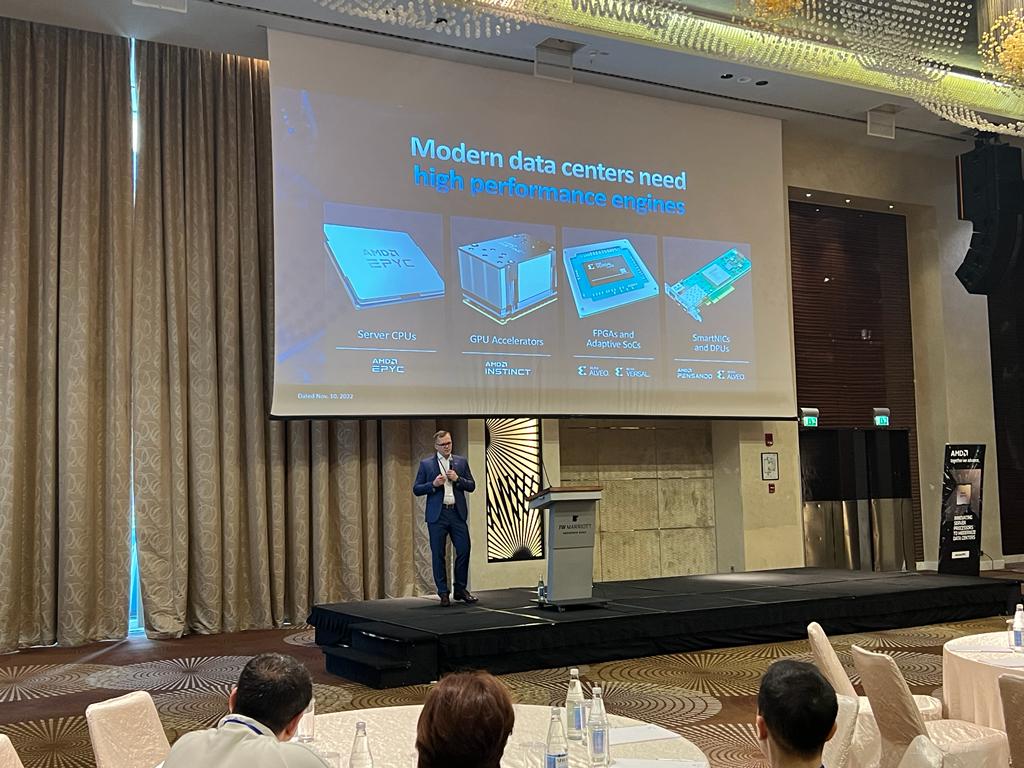
"New Generation - Go Together!" conference dedicated to the latest solutions from AMD and HPE took place.
On December 16, the JW Marriott Absheron Hotel in Baku hosted the New Generation - Go Together! conference, dedicated to the latest generation of AMD server processors and the latest HPE solutions. The event, which brought together the partners and customers of these two world-famous manufacturers, was organized by one of the largest wide-range IT distributors in the Caucasus and Central Asia represented by Techpro DC.
Adam Tomczak, head of AMD's server business in Central and Eastern Europe and the Middle East, addressed the guests of the event with a welcome speech, and spoke about the manufacturer's new products and his view about the future development of the AMD server processor lines. The AMD representative's presentation detailed the features and benefits of the fourth generation of AMD EPYC processors.
AMD introduced the EPYC Genoa series of processors for servers and data centers in November of 2022. The EPYC 9000 series of CPUs, like the new Ryzen 7000, is based on the Zen 4 architecture and is manufactured using a 5 nm process technology. EPYC 9000 contains up to 12 processor cores, while top models models received 96 cores and support 192 computational threads. The processors support BFLOAT16, VNNU and AVX-512, up to 6 Tb of 12-channel DDR5-4800 RAM, and up to 128 PCI-E lanes per socket. In addition, the processors are announced to support CXL 1.1 and partially CXL 2.0, which provides significant memory expansion options for data center applications. AMD claims for EPYC Genoa an increase in the number of executable instructions per clock (IPC) at the level of 14% compared to previous generation solutions at the same TDP. At the same time, the performance of new processors per watt of energy consumed in individual tasks increased by up to 2.7 times compared to their predecessors based on Zen 3. In tasks related to cloud computing, the performance of new products is up to 3 times faster than that of competitors. The company claims that EPYC Genoa-based systems will cost significantly less to maintain than systems based on competitive solutions. AMD chips are up to 52% more energy efficient than their competitors.
The speech of Elkhan Guliyev, the representative of the HPE local office was devoted to the new generation of HPE ProLiant servers. Elkhan noted that all models of the eleventh generation of the ProLiant family support the entire range of models of the new AMD EPYC 9000 series processors, ranging from junior 16-core processors to 96-core ones. All servers have 12 memory slots per socket. With a 256 GB DIMM, this gives up to 3 TB of memory for a single-socket server, and up to 6 TB for a dual-socket one, and additional accelerators are often used to provide even higher performance on some modern tasks. All servers support SAS/SATA HDD/SSD drives, as well as NVMe SSDs and the new high-density Enterprise & Datacenter SSD Form Factor (EDSFF). This allows up to 36 EDSFF drives (*DL385Gen11) and 48 SFF HDD/SSDs (*DL385Gen11). An updated version of Boot Optimized Storage Device is now hot-pluggable, HPE NS204i-u Gen11 NVMe embedded two (2) 480GB M.2 NVMe SSD. Also, now the servers have two OCP 3.0 x16 Slots instead of one, as it was before.
Continuing on the topic of new HPE line up of products, HPE representative Orkhan Mirsadigov spoke about the innovations that the company has implemented in its lines of HPE Alletra storage systems. HPE Alletra storage is a cloud-based block storage platform, and all associated arrays are managed through a cloud-based SaaS console. The platform combines Flash memory and hard disk storage. Orkhan especially noted that the company recently expanded its portfolio with a new series of Alletra 5000 hybrid arrays with 100% availability. Alletra 6000 and 9000 models have built-in NVMe Flash memory. The 6000 series is based on HPE Nimble storage arrays, and the 9000 series is based on the HPE Primera platform. The new HPE Alletra 5000 series are based on the Nimble platform and hybrid array model, providing a 25% increase in value for money over existing HPE Nimble Storage hybrid arrays. In addition, the new HPE Alletra 5000 arrays are expandable up to 1000 TB of effective space and support RAID Triple+ Parity, which allows the array to withstand a simultaneous failure of three drives without losing data,” said Orkhan Mirsadigov.
At the end of the conference, Cağlar Özben, Qumulo Territorial Manager, shared his experience of cooperation with HPE, whose report was devoted to the topic about managing unstructured data. “HPE is working with Qumulo to address the growing storage needs of unstructured data in a scalable and manageable way. Distributed computing, where hundreds of individual computers work together, is the only way to handle current scaling requirements. Qumulo is software for a scale-out, file-based, software-defined storage environment running on specially pre-configured HPE Proliant and HPE Apollo 4200 servers,” said Caglar Ozben. Powered by HPE, the Qumulo solution guarantees the ability to store a virtually unlimited number of files, with the ability to handle small files as efficiently as large ones. In addition, the solution guarantees comprehensive data protection, including error-correcting coding and replication.

